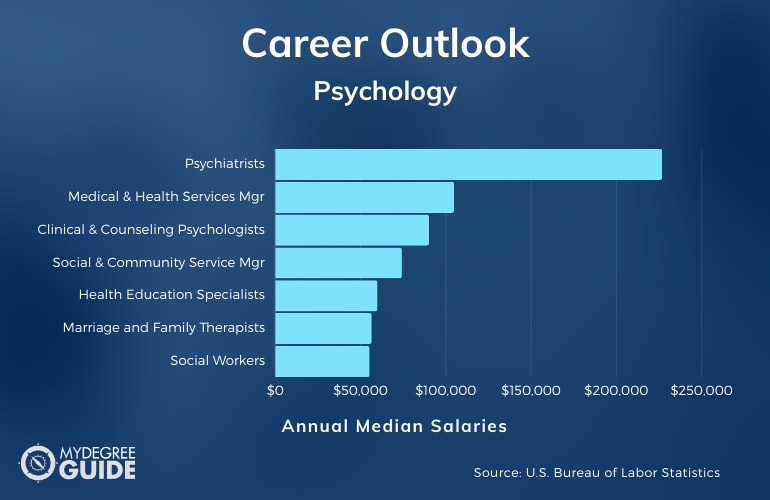Is psychology a good major for med school? You may be asking this question if you’re interested in pursuing a career in the healthcare field.

Psychology majors study how humans behave, mentally process information, and interact with others. They explore every aspect of the human psyche, from abnormal behavior to personality development.
Editorial Listing ShortCode:
This article explores what aspiring medical students need to know about choosing psychology as a major, including career paths and alternative degrees.
Is Psychology a Good Major for Med School?

Yes, psychology is a good major for med school for many undergraduate students.
A psychology degree allows you to analyze the inner workings of the human mind. Mental and physical health are closely related, so this degree can help prepare you to work with patients in various healthcare settings.
Psychology programs typically cover numerous topics related to healthcare, such as:
- Abnormal psychology
- Biopsychology
- Clinical psychology
- Cognitive psychology
- Health communication
- Health psychology
- Human development
- Psychopharmacology
- Psychology of aging
Many colleges offer opportunities for psychology majors to apply their skills outside the classroom. For example, you might help faculty conduct experiments or interpret data.
You may also present your work at a research conference or intern with a local healthcare organization. These activities can strengthen your medical school applications. Additionally, a psychology degree can apply to numerous alternative career paths that don’t require a medical degree. Many psychology majors go to graduate school and become licensed psychologists.
According to the Bureau of Labor Statistics, the median salary for psychologists is $85,330. Some graduates use their psychology degrees to become social workers. These professionals have a median annual salary of $55,350. Others become substance abuse, behavioral disorder, and mental health counselors. The median salary for these positions is $49,710.
Common Premedical Course Requirements

Medical schools require students to complete a series of prerequisite courses before they apply. The courses you take while earning a psychology degree can help you meet these requirements.
Here are ten common premedical course requirements often covered in psychology programs:
- Behavioral Sciences
- Biochemistry
- Biology
- Calculus
- Chemistry
- English Composition
- Introduction to Psychology
- Organic Chemistry
- Psychics
- Statistics
Many colleges offer a psychology major pre-med track. These programs ensure you complete all the prerequisite courses for medical school before you graduate.
5 Things You Can Do with a Psychology Degree in the Medical Field

Many psychology majors go to medical school and become doctors. But, majoring in psychology can also prepare you for a broad range of careers in the healthcare industry that don’t require a medical degree.
1. Case Manager
A case manager helps patients navigate the medical system and coordinates care services. They also advocate for patients, ensuring they receive quality care, and connect them with resources to support their well-being.
Case managers with psychology degrees may specialize in helping patients with mental illnesses or substance use disorders.
2. Health Psychologist

A health psychologist supports patients with behavioral, mental, or physical health conditions. They may help people cope with life-altering illnesses and injuries, such as cancer and diabetes. They also teach patients strategies to make healthy lifestyle choices and improve their overall well-being.
Health psychologists need a doctorate to work in clinical settings.
3. Behavioral Specialist

A behavioral specialist treats patients with behavioral disorders and impairments. They collaborate with other healthcare specialists to create and implement behavioral intervention plans. Additionally, they teach clients how to understand and modify negative behaviors.
Behavioral specialists can work for correctional facilities, hospitals, private clinics, and schools.
4. Rehabilitation Specialist

A rehabilitation specialist provides occupational and vocational training for clients with chronic health conditions and disabilities. They help patients learn strategies and access resources that improve their everyday lives.
For example, a rehabilitation specialist may teach clients how to maneuver wheelchairs in challenging terrain, manage their time efficiently, and shower independently.
5. Psychiatric Technician

A psychiatric technician cares for patients with disabilities, mental illnesses, or substance use disorders. They provide a variety of services, such as performing behavioral assessments, administering medications, and updating medical records.
Psychiatric technicians can work in private clinics, psychiatric hospitals, rehab facilities, and other healthcare settings. They’re typically supervised by licensed psychiatrists.
Pre Med Psych Degree Alternatives for Medical School

Psychology is a popular major for premed students, but it isn’t the only path to medical school. Here are three other med school majors that could help you check off prerequisite courses:
- Bachelor’s in Biology. Biology majors gain a strong foundation in the sciences, which prepares them to study the human body in medical school. This degree also includes many prerequisites and recommended courses for medical school, such as organic chemistry and zoology.
- Bachelor’s in Biochemistry. This degree studies chemical processes that occur inside the cells of humans and other living organisms. Biochemistry majors take prerequisite courses like biology and physics.
- Bachelor’s in Mathematics. This degree helps prepare you for medical school by strengthening your problem-solving and data analysis skills.
Medical schools accept students from all majors who meet their requirements, so you can choose the degree that fits your interests and goals.
Psychology Careers in Healthcare

A psychology degree can teach you how to interact with people from diverse backgrounds and support patients with various health conditions. Psychology majors can use their knowledge and interpersonal skills to pursue a wide range of careers in the healthcare field.
According to data from the Bureau of Labor Statistics, here are the median salaries of various professionals in the healthcare field who can benefit from a background in psychology.
| Careers | Annual Median Salaries |
| Psychiatrists | $226,880 |
| Medical and Health Services Managers | $104,830 |
| Clinical and Counseling Psychologists | $90,130 |
| Social and Community Service Managers | $74,240 |
| Health Education Specialists | $59,990 |
| Marriage and Family Therapists | $56,570 |
| Social Workers | $55,350 |
| Substance Abuse, Behavioral Disorder, and Mental Health Counselors | $49,710 |
| Rehabilitation Counselors | $39,990 |
| Psychiatric Technicians and Aides | $37,330 |
Some of these careers require additional education or licensing beyond a bachelor’s degree in psychology. For example, clinical social workers often need a master’s degree and a state license.
Similarly, psychologists typically need a doctoral degree, though positions in industrial organizations and schools may only require a master’s degree. Psychiatrists, on the other hand, are required to complete medical school.
How to Choose a Pre Med Major

There are many factors to consider when selecting a pre med major, including:
- Curriculum. Choosing a major that overlaps with med school prerequisite courses can help you avoid taking extra classes.
- Professional goals. Many students choose a major that aligns with their career goals. For instance, if you want to become a neurologist, you might major in neuroscience.
Psychology is one of the most popular premed majors. The psychology premed track includes many prerequisite med school courses, such as biology and physics. It also helps students develop interpersonal skills that they can use while interacting with patients.
Advantages and Disadvantages of a Pre Med Psychology Degree
To help you weigh your options, here are some pros and cons of majoring in psychology as a pre-med major.
| Advantages | Disadvantages |
|
|
A psychology major offers a unique perspective and skill set that can be highly beneficial in healthcare, but it may also require careful planning to ensure all prerequisites for medical school are met.
Do Psychologists Go to Medical School?

Both psychologists and physicians have the title of “doctor,” but they don’t have the same education.
Psychologists don’t go to medical school. They typically enroll in doctoral programs in psychology, earning a Doctor of Philosophy (PhD) in Psychology or a Doctor of Psychology (PsyD). These programs often take 3 to 5 years to complete. Students participate in clinical rotations, take classes, and may write dissertations before graduation.
By contrast, physicians, including psychiatrists, attend medical school for around 4 years. They also tend to spend 3 to 7 years in residency before practicing independently.
What Can I Do with a Psychology Degree in the Medical Field?

What can you do with a psychology degree in the medical field? A background in psychology can be beneficial for a number of careers in the field. Many psychology graduates become mental health counselors and treat patients with behavioral or mental disorders. Others become psychiatric technicians and provide care for people in hospitals, psychiatric facilities, and other settings.
Some psychology majors go on to earn doctoral degrees in psychology and become licensed psychologists. These experts diagnose and treat clients. They also teach behavioral modification techniques and other psychotherapeutic methods.
A psychology degree can also be beneficial for those who are interested in attending medical school and becoming psychiatrists. A psychology background can be beneficial for roles in social work as well.
Is a Psychology Degree Worth It?
Yes, a psychology degree is worth it for many students. You can pursue a BA or BS in Psychology for med school. This degree typically includes most or all prerequisite courses for medical school, so you likely won’t have to spend time and money completing extra classes.
A psychology degree can help you develop valuable skills you can apply in the healthcare industry. For instance, you can learn critical thinking and problem-solving skills that could be useful for diagnosing and supporting patients.
You can also enhance your research skills and study the connections between mental and physical health. The Bureau of Labor Statistics projects that healthcare occupations will grow much faster than average over the next ten years.
Getting Psychology as Your Pre Med Degree Online

Majoring in psychology can be a strategic choice if you want to attend medical school. This degree lets you deepen your understanding of human behavior and thought processes.
As a medical doctor, you can use this knowledge to provide patient-centered care and treat mental health disorders. Many schools offer a psychology major pre-med track that includes all the prerequisite courses for medical school. These programs may also have special clinical experiences and research opportunities designed for premed students.
If you’re ready to investigate the human mind, you can get started today by researching accredited schools that offer online programs in psychology.
